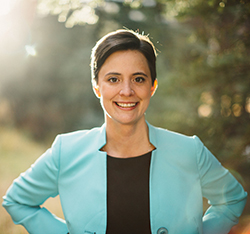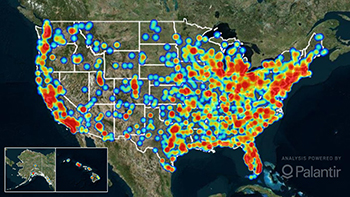Business That Seeks to End Human Trafficking Housed in UWs WTBC
Published February 05, 2020

Since 2007, there have been 71 cases involving 92-120 victims of human trafficking in Wyoming, according to the National Human Trafficking Hotline.
A client of the University of Wyoming’s business incubator for nearly 10 months has been building solutions to accelerate the end of human trafficking in Wyoming and nationwide.
The Alliance for Freedom, Restoration and Justice (AFRJ) -- housed in the Wyoming Technology Business Center (WTBC) since last April -- has been shining a light on this scourge that is estimated to be a $150 billion business annually and involves roughly 40 million people trafficked worldwide, with more than 325,000 victims in the U.S.
“Starting this year, we have begun working with the excellent leadership of both the city of Laramie and the Attorney General’s Human Trafficking Taskforce to help strengthen the anti-trafficking efforts in Wyoming; to better understand how trafficking is taking place in our state; what types of trafficking are present; what vulnerabilities are being exploited; and what resources are available to help combat and prevent it,” says Ashleigh Chapman, president and CEO of the AFRJ.
While the public may only hear of human trafficking through high-profile cases last year such as the Jeffrey Epstein case or the takedown of the largest darknet child pornography website in the world that resulted in hundreds of arrests, the crime is one that can happen anywhere.
“I have personally worked with both large urban cities and small rural towns, and I can say without a doubt, no community is immune,” Chapman says.
With human trafficking victims in the United States approaching nearly 1 million and the fact there were only 41,000 calls made to the National Human Trafficking Hotline in 2019, Chapman decided to make a bold move to improve those reporting numbers.
The AFRJ launched the Every Day Heroes Challenge Jan. 11, which was National Human Trafficking Awareness Day in the United States. The challenge is designed to engage everyday people to become heroes against human trafficking by completing a one-hour online course.
The campaign seeks to get 1 million people to take the free course and earn their online Human Trafficking Awareness badge so citizens can move from awareness to action. The free course was set up so people could spot signs of trafficking every day -- whether in their local communities or while traveling. Signs to look for are based on what type of trafficking is taking place; what individual is being trafficked; and how citizens are likely to interact with potential victims or perpetrators.
“The question we get the most is: ‘Is there anything I can do that could possibly help?’ The answer is a resounding ‘yes,’” Chapman says. “We believe every person is uniquely positioned to make a difference. And that when we engage together, miracles can happen on behalf of those in need. All of our resources help every individual take the journey from awareness to action.”
The campaign’s tagline is “You can spot human trafficking. Together, we can stop it.” Chapman says the campaign will continue until the 1 million number is reached. As of Jan. 31, the number of people taking the online course stands at 2,553.

Before founding the AFRJ, Chapman served as the co-founder and director of the Center for Global Justice at Regent University School of Law in Virginia; the director of a nonprofit serving thousands of at-risk youth in Tennessee; a children’s pastor; and a court-appointed special advocate for children in foster care.
Chapman has worked solely on issues of human trafficking and protecting vulnerable populations for the past 18 years and has traveled extensively. In August 2018, she and her husband, Sloan -- after having vacationed in Wyoming the previous year -- decided to call Laramie their home and look for a place to hang a shingle.
“As a human rights lawyer and director of a global nonprofit, I travel extensively to help communities everywhere combat human trafficking, and I desperately needed a place to call home that was restorative and reminded me that there was beauty in the world still, even in the face of such a darkness as human trafficking,” Chapman says. “We visited Laramie and knew immediately it was home.”
She says she has dreamed of launching a business that would help accelerate the anti-trafficking movement by innovating solutions in technology, finance, education and business.
“But, having spent nearly two decades in the nonprofit sector, I knew I needed a great deal of coaching and help to get it done,” Chapman says.
In March 2019, she and her husband discovered the WTBC while researching support in the state for new companies. They met with the WTBC’s leadership team and became an incubator client in April 2019.
Chapman says the WTBC has provided coaching, advice, expertise, accessibility, support, networking, and daily guidance and encouragement -- all of which helped move the AFRJ from concept to launch in just seven months’ time.
“We are now in the investment raising phase of the company, Altus Solutions Inc., and the WTBC team continues to help us make it all happen,” she says. “I could not have done it without them.”
Altus is a completely different kind of company, with a focus unlike any other client the WTBC has had, says WTBC Director Dave Bohling.
“Ashleigh brought a highly functional nonprofit to Wyoming about a year ago, but wanted to convert part of that nonprofit to be a for-profit company that also could fund the nonprofit side,” Bohling says. “That’s a highly intriguing concept to try to coach through, but the standard issues of value proposition, business model and everything else we teach/counsel/mentor remains extant.”
Bohling says the WTBC was impressed that Chapman brought to the table an extensive level of data mining; the potential for artificial intelligence or broad learning in evaluating that data; tracking system technology; and a plan to hire a large team.
“Plus, it was almost clear instantly that Ashleigh is eminently coachable and just an all-around pleasant person, but also on a highly challenging mission on which we wanted to help,” he says.
“WTBC has been the accelerator for us to make our dream of creating a business to accelerate the end of human trafficking a reality,” Chapman adds.
For more information, email Chapman at Ashleigh@engagetogether.com.
For Wyoming statistics on the National Human Trafficking Hotline, go here.

